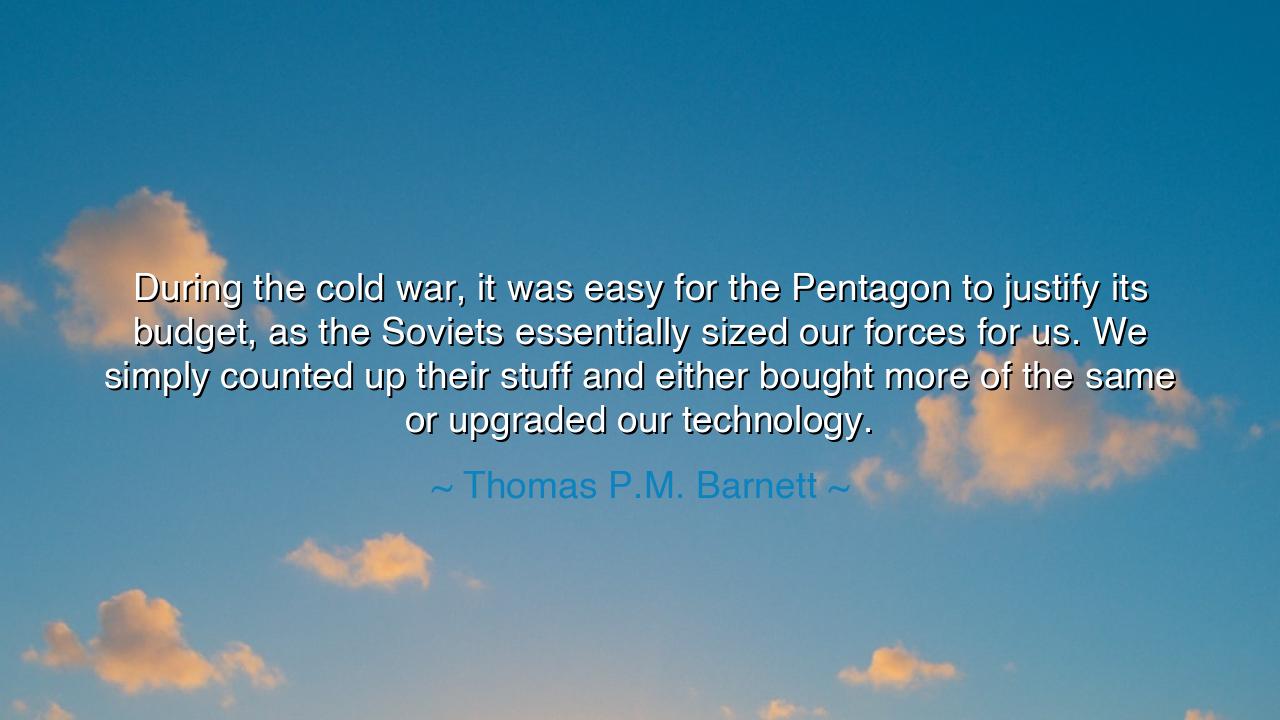
During the cold war, it was easy for the Pentagon to justify its
During the cold war, it was easy for the Pentagon to justify its budget, as the Soviets essentially sized our forces for us. We simply counted up their stuff and either bought more of the same or upgraded our technology.






Thomas P.M. Barnett, a strategist of modern times, once declared: “During the Cold War, it was easy for the Pentagon to justify its budget, as the Soviets essentially sized our forces for us. We simply counted up their stuff and either bought more of the same or upgraded our technology.” These words, though rooted in military affairs, unveil a timeless truth about human rivalry, fear, and the ways in which enemies shape one another. In them we see that great powers, like dueling titans, define themselves not only by their own desires but by the shadow cast by their adversaries.
The ancients knew this dance of opposites. The Spartans sharpened their blades because the Athenians built ships, and the Athenians raised walls because the Spartans drilled their warriors. Each side’s strength called forth an answering strength from the other. Barnett reveals that in the Cold War, the same ancient rhythm continued: the Soviets built arsenals of tanks, missiles, and bombs, and the United States, guided by the Pentagon, answered in kind—measuring, calculating, and matching, as if locked in a mirror’s embrace. In truth, each side became a reflection of the other’s fear.
This principle can be seen clearly in the nuclear arms race. When the Soviets tested their first atomic bomb in 1949, the United States escalated by building the hydrogen bomb. When the Soviets increased their missile stockpile, America multiplied its own. Like two men trapped in a contest of endurance, neither sought peace, for each feared that to pause was to fall behind. Barnett’s words capture this reality: justification was simple, for the enemy’s strength dictated one’s own response. There was no deeper philosophy—only the cold mathematics of survival.
Yet, Barnett’s statement also carries irony. For though the Pentagon found it “easy” to justify its spending, such ease was born not of wisdom but of dependence on fear. True strength, the ancients would say, is not only measured by what your enemy builds but by what your people need, by what your values demand. When Rome grew bloated with armies to match distant threats, it drained itself from within. The same danger lurks in any nation that measures its worth only against its rivals. Fear may bring urgency, but it rarely brings balance.
Consider also the story of the Great Wall of China. It was raised higher and longer with each new invasion, as rulers counted the weapons and riders of their foes. And yet, despite its grandeur, it could never alone secure peace. Like the Cold War arms race, it was a monument to reaction, not creation. Barnett’s insight reminds us that to be defined only by what the enemy does is to surrender a measure of one’s destiny. Strategy born only from rivalry is strategy chained to another’s will.
From this truth arises the lesson: whether in nations, businesses, or personal lives, do not size yourself only by the measure of others. Do not let the shadow of a rival determine your strength, your choices, your worth. To react is necessary at times, but to build always in reaction is to live as a slave to another’s ambition. True mastery comes not from imitation or escalation, but from vision—knowing what you yourself must become, regardless of the adversary.
So, dear listener, take Barnett’s words as both a mirror of history and a warning for the present. Let them teach you that rivalry can sharpen, but it can also enslave. If you must prepare, prepare wisely; if you must build, build with foresight, not only in reaction. For whether in war or in life, the greatest victories are not won by endlessly counting the enemy’s weapons, but by crafting a future guided by purpose, vision, and the courage to define yourself. Do not let your enemy measure your strength—measure it by the greatness you are called to achieve.






AAdministratorAdministrator
Welcome, honored guests. Please leave a comment, we will respond soon